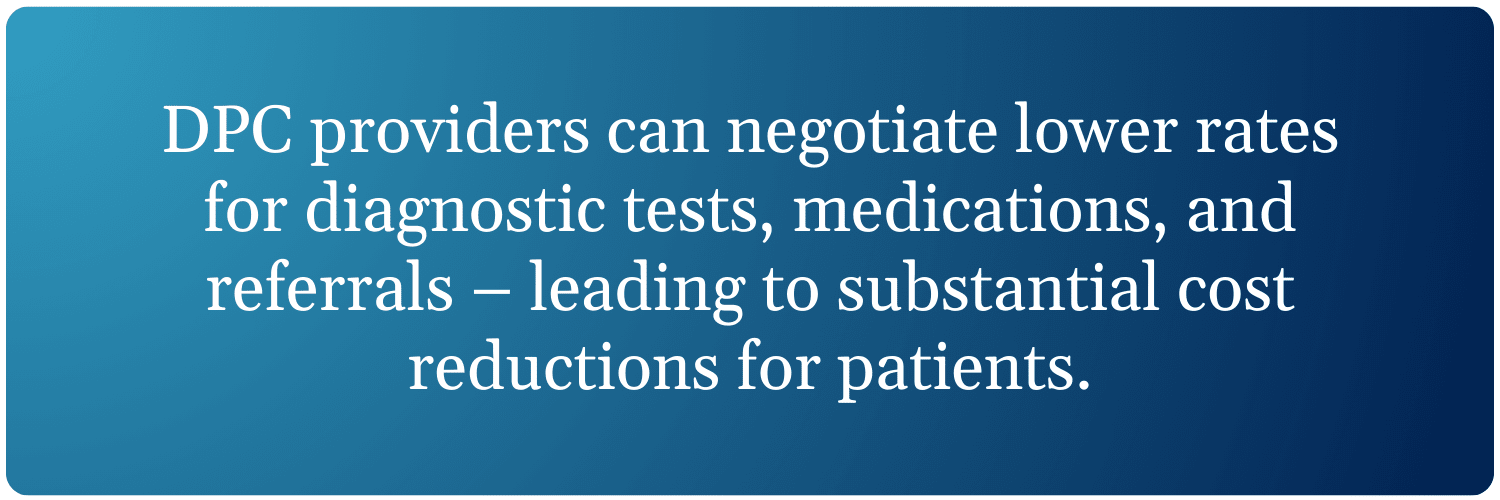What is Direct Primary Care?

This blog was originally published in June 2017 and was updated in June 2023.
Direct primary care (DPC) is swiftly growing in popularity in the healthcare industry. But what is direct primary care, and how does direct primary care work?
We will discuss what direct primary care is, what it means to be a DPC physician, and the benefits of the direct primary care model for doctors and patients – so you can decide if this model is right for your practice.
What is Direct Primary Care?
Direct primary care is an innovative model of primary care that gives physicians alternatives to traditional fee-for-service insurance billing. Reducing the overhead for third-party insurance allows physicians to lower fees and spend quality time with fewer patients – for the same cost.

Key Features of Direct Primary Care
What is direct primary care at its essence? It is a patient-centric model that allows you to spend more time with your patients and prioritize the patient-physician bond.
The unique payment structure of direct care eliminates many of the administrative burdens physicians face – so what is a DPC physician’s time spent doing?
The DPC model frees up more time for physicians to focus on patient care and engagement. Patient engagement can include:
-
Sending and receiving messages with patients
-
Communicating lab results
-
Discussing general health information
-
Keeping a channel of open communication to build trust with patients
So now that you have a better understanding of what direct primary care is, how does direct primary care work? Let’s dive into the details.
How Does Direct Primary Care Work?
Direct primary care physicians charge their patients a retainer. This DPC membership may be charged monthly, quarterly, or annually and is used to cover services. These membership fees can easily be managed through a DPC All-In-One membership management system.
Often, supplemental insurance for emergency situations is suggested on top of the DPC membership.
The direct primary care model eliminates insurance-related expenses and reduces reliance on costly medical procedures. Because of this, DPC providers can negotiate lower rates for diagnostic tests, medications, and referrals – leading to substantial cost reductions for patients.
Direct Primary Care Models vs. Traditional Healthcare Models
Traditional healthcare has been the standard in the USA for years. In the traditional model, a patient’s health insurance pays for the majority of medical services and products.
Direct primary care, on the other hand, does not rely on payments through health insurance companies.
What is a DPC physician paid with, then?
DPC physicians are paid through direct monthly or annual membership payments from their patients. This model reduces overhead costs and allows for patient care to be more comprehensive and personalized.
Benefits of Direct Primary Care
The direct primary care model has many benefits for both physicians and patients.
Physicians experiencing burnout might find that direct primary care is what works best for them. Benefits of direct primary care for physicians include:
-
Focusing on the quality (not quantity) of patient care
-
Developing stronger relationships with patients
-
Reduced overhead costs
-
Fewer administrative duties (no need to hire staff to handle third-party insurance claims)
-
Simplified billing
-
Better work-life balance
Having a DPC membership has many benefits for patients as well, including:
-
More individualized and personalized care
-
Better access to timely and convenient care
-
Extended appointment hours
-
Better communication over the phone
-
More affordable costs
-
Increased preventive care
-
Better chronic disease management
-
Improved overall health outcomes
Think Direct Primary Care is Right for You?
Whether you are a DPC veteran, a new DPC physician, or considering starting a DPC practice, doing your research and staying up-to-date on the latest in direct primary care models can help you achieve your practice goals.
Elation EHR is a leading electronic health record (EHR) system specifically designed for DPC providers. This direct care EHR allows for simplified documentation, streamlined communication, and enhanced patient data management.
Request a demo of Elation Health EHR, and download our helpful DPC Checklist to get expert insights into everything you need to know to run a successful DPC practice.
Download Our Free Direct Primary Care EBook
Making the decision to establish a new primary care practice is an exciting first step in your direct care journey. Download our free Direct Primary Care checklist to get an expert step-by-step guide to starting your own DPC practice.
FAQs
Here are commonly asked questions about what direct primary care is and how it helps patients:
What is a Direct Patient Care Model?
“Direct patient care” is often used interchangeably with “direct primary care.” Direct primary care is the official term, and it is a system that eliminates third-party insurance costs so doctors can focus more time and energy on patient relationships and outcomes.
What is a DPC physician?
A DPC physician is a physician who follows a direct primary care model of service.
What are the benefits of Direct Care?
There are so many benefits of direct care! Direct primary care allows physicians to lower costs, spend more one-on-one time with each patient, and provide better outcomes for patient care.
What is the Primary Care Model?
The primary care model supports comprehensive and accessible care for a patient’s health needs. A primary care physician is the first point of contact for patients in the healthcare system.
